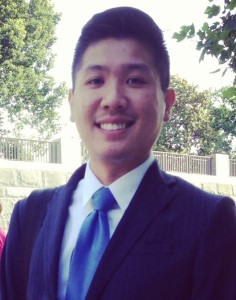
In the spring of 2011, the University of California Santa Cruz senior was sure he was so tired because he wasn’t taking care of himself – not unusual for a busy student organizer winding up his final year in college. But when his neck started swelling, he figured he better go have it checked out. He saw a doctor in late August 2011, and had blood tests, CT scans and a biopsy. When the diagnosis came back, he learned that instead of joining his peers in launching a career, he would be embarking on a life and death struggle with stage 3 Hodgkin’s lymphoma.
At the time he saw the doctor, he had temporary, month-to-month insurance coverage available to recent graduates through the university alumni association. His deductible was $1,000 so his initial costs were paid out of his own pocket. With costs quickly growing to more than $8,000, Kalwis expected his plan to help cover his costs after he met his deductible, but it didn’t. Kalwis recalls the insurer telling him and his doctor that at such an advanced stage, the cancer was something he had when he applied for coverage a couple months before – a pre-existing condition – so the plan denied any care associated with the cancer.
After the initial costly testing, Kalwis started chemotherapy immediately. Because he had to pay out of pocket for the chemotherapy, Kalwis’s doctor agreed to charge only $350 per treatment. He needed two rounds of chemotherapy a month for 8 months. His parents, both of whom work at jobs that don’t offer coverage, and his aunt, helped cover the costs. It was a hardship for them, but after his mom lost her only brother to cancer, they were not going to let Kalwis fight cancer on his own.
The regular chemotherapy treatments left Kalwis very little energy to fight his plan’s denials of coverage for care he needed, or to navigate the unruly world of insurance for a person with a serious health condition. When his temporary coverage ran out, he applied for individual coverage but was denied, and was found ineligible for California’s Medicaid program. Just when he was sure there was no option for him but to remain uninsured and pay out of pocket, he caught news coverage in early 2012 of a vote in the U.S. House of Representatives to repeal the Affordable Care Act.
As student body president at UC Santa Cruz and a member of the U.S. Student Association, he helped mobilize students to support the ACA. He remembers listening to the congressional debate on the bill and hearing a Member of the House ask, “What does health care have to do with students?” Kalwis recalled thinking then that even though most students are healthy, it doesn’t mean they can’t get sick. So almost 2 years after the bill he supported became law, Kalwis started poking around www.healthcare.gov for what the law could do for him. And that’s when he learned about the Pre-existing Condition Insurance Plan (PCIP), the temporary program for uninsured individuals who are turned down for coverage because of a pre-existing condition. He applied for PCIP in California and his coverage began April 1, 2012.
His final four rounds of chemo were under his $2,000 deductible for the PCIP plan, but most of the cost of the CT scan he needed to track the progress of his treatment was paid by PCIP. Of a total bill of $2,300, Kalwis paid just $420 out of pocket. And most importantly, the tests confirmed that his cancer is in remission.
With his battle with cancer behind him, Kalwis could turn once again to lining up a job that uses his degree in political science. In July 2012 he started a full time job as the Legislative Director at the U.S. Student Association in Washington, D.C. He ended his PCIP coverage that month when he qualified for coverage through his new job. His plan at work covers his ongoing care – a CT scan every 6 months just to be sure the cancer is still in check.
And if Kalwis ever decides to pursue a new job, he can put his interests and education ahead of his health care needs. His next job may offer him benefits, too, but if it doesn’t, he can still shop for coverage without the worry of being turned down or charged more because of his history of cancer. And the Health Insurance Marketplace will make it easy to shop with confidence that the plans have met minimum quality standards, cover a core set of benefits, and limit out-of-pocket costs.
So while his cancer diagnosis at age 22 took Kalwis on a detour he could never have seen coming, the health coverage he gained under the ACA put him back on a path to a job that makes good use of his education, experience and interests. And his health history won’t set him apart from every other 24 year old who may need to buy coverage on their own.


1 Comment
I absolutely love your blog and find the majority of your post’s to
be just what I’m looking for. Would you offer guest writers to write conmtent for you personally?I
wouldn’t mind producing a post or elaborating on
some of the subjects you write regarding here. Again, awesome web
log!
3 Trackbacks and Pingbacks